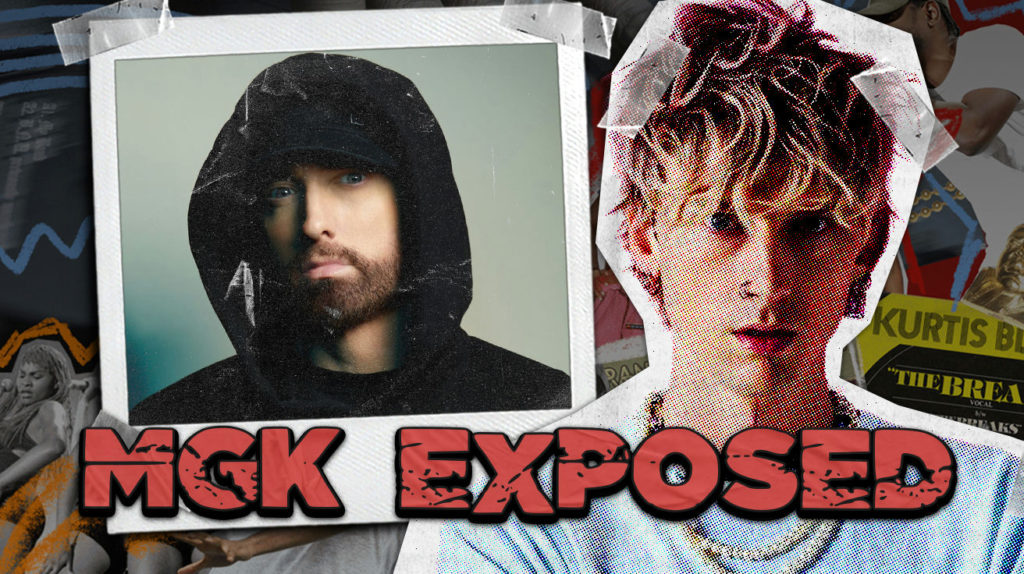
Machine Gun Kelly operates like that friend who sets their own house on fire just to see who shows up with water. His career trajectory from Cleveland rapper to pop-punk provocateur reads like a masterclass in controversy economics—where media storms generate more buzz than actual music. You’ve watched him pivot from beef-starting rap battles to power chord tantrums with the precision of a Vegas card counter. The real question isn’t whether MGK’s misunderstood. It’s whether his entire persona functions as a deliberately calibrated chaos machine designed to keep you scrolling, streaming, and arguing about him online.
9. The Cover Song Catastrophes

Here’s the thing about covering Linkin Park’s “Numb”—you’re not just covering a song, you’re handling someone’s emotional blueprint. Chester Bennington built that track on controlled desperation, every vocal crack intentional. MGK’s version sounds like someone doing karaoke at a dive bar after three too many energy drinks. He strips away the delicate balance between Mike Shinoda’s electronics and the band’s rock foundation, replacing nuance with volume.
His Howard Stern performance of “Aerials” hit even worse. System of a Down’s original is controlled chaos—Serj Tankian’s vocals dance between beautiful and unhinged while the band locks into those off-kilter rhythms that somehow make perfect sense. MGK turned it into basic chord-strumming 101, like watching someone try to recreate a Pollock painting with house paint and a roller brush.
8. The Attention Economy Master

MGK has cracked the code of modern fame—diversify your chaos portfolio. Movies, fashion collabs, social media feuds, surprise genre pivots. It’s like watching someone play the entertainment industry like a stock market, hedging bets across every possible demographic. His approach to music scenes feels less like genuine passion and more like a consultant’s PowerPoint about “engaging multiple target audiences.”
The strategy works because attention is the new currency, and MGK understands that negative engagement pays the same bills as positive. In an ecosystem where algorithms reward controversy over quality, he’s essentially gaming the system. Smart? Absolutely. Soulful? That’s where things get murky, especially when you’re trying to figure out if there’s actual music underneath all the marketing machinery.
7. The Contradiction Collection

MGK talks like someone who’s paid his dues while living like someone who skipped straight to the payoff. He’ll criticize industry veterans in interviews, then complain when those same veterans don’t show him respect. It’s like watching someone demand a seat at the cool kids’ table while simultaneously trash-talking everyone already sitting there.
Watch him discuss technique with the confidence of someone who’s mastered the instrument, then notice how much his live shows depend on backing tracks to fill the sonic gaps. It’s the musical equivalent of someone who learned three chords on YouTube opening a guitar academy. The energy is undeniable, but the skills? That’s a different conversation entirely.
6. The Disturbing Pattern

Look, we need to talk about the elephant in the room—MGK’s history with inappropriate comments about underage individuals isn’t a “bad tweet” situation. This is a documented pattern that includes his 2012 comment about Eminem’s then-16-year-old daughter and remarks about Kendall Jenner when she was 17 and he was 23. Fame doesn’t excuse crossing these lines, period.
These aren’t social media oops moments or misunderstood jokes. They represent concerning attitudes that deserve serious examination, separate from debates about his musical merit. Sometimes supporting an artist means holding them accountable for behavior that goes beyond artistic controversy into genuinely problematic territory. This pattern matters more than any album review ever could.
5. The Studio Magician

The magic happens in post-production, and MGK’s team deserves a Grammy for making him sound technically proficient on record. Pitch correction, strategic compression, layered harmonies—it’s a masterclass in modern studio wizardry. His recorded vocals have that crisp, controlled aggression that makes you think he’s got serious chops. Then you catch him live and realize you’ve been listening to the musical equivalent of Instagram filters.
His guitar work tells the same story. Those tight power chord sections on “Tickets to My Downfall” sound punchy and precise on the album. Live? It’s enthusiastic strumming with about as much technical range as your average campfire singalong. The production team deserves credit for creating cohesive soundscapes, even when the raw ingredients need serious enhancement to get there.
4. The Legal Troubles Timeline

MGK’s rap sheet reads like someone who genuinely believes rules are suggestions for other people. Multiple arrests for marijuana possession, disruptive behavior at airports, post-show incidents—the pattern suggests someone who thinks fame provides immunity from consequences. While “three arrests in 72 hours” might be social media mythology, his documented run-ins with law enforcement are real enough.
He’s characterized these as “bad decisions,” but the frequency raises bigger questions about judgment and impulse control. Were these youthful mistakes or evidence of someone who operates by different rules? When you’re trying to separate the artist from the persona, these real-world consequences matter. Sometimes the chaos isn’t calculated—it’s just chaos.
3. The Self-Sabotage Specialist

Some artists master their instruments; MGK has perfected the art of precision self-destruction. His timing with controversy is actually impressive—like watching someone detonate their own career at exactly the moment when momentum should be building. That 2012 Eminem tweet about his daughter? Nuclear-level bad judgment that resulted in “Killshot,” a diss track that didn’t just end beef—it became a cultural funeral service.
But here’s the wild part: it keeps happening. After Corey Taylor contributed to “Tickets to My Downfall,” MGK publicly trashed Slipknot’s frontman at Riot Fest, tweeting that Taylor’s verse was “fucking terrible.” These aren’t accidents or heat-of-the-moment mistakes. They’re calculated detonations that mysteriously coincide with album promotion cycles. This pattern of verbal grenades mirrors a long tradition of musicians using public meltdowns as spectacle—except usually the chaos isn’t this strategically timed.
2. The Genre Chameleon

MGK’s musical evolution reads like market research disguised as artistic growth. His rap era featured machine-gun flows over trap beats—technically solid but lacking the lyrical depth that separates good from legendary. Then “Tickets to My Downfall” dropped, and suddenly he’s doing power chord progressions and pop-punk melodies that scream “remember when you loved Good Charlotte?”
Here’s what’s interesting from a sonic perspective: the pivot actually worked musically. Those early 2000s nostalgic production choices hit different in 2020, and his vocals suited the emotional terrain of pop-punk better than the rapid-fire requirements of modern rap. But when “Mainstream Sellout” couldn’t match those platinum numbers, his announced return to rap felt less like artistic calling and more like someone checking their streaming analytics and pivoting accordingly.
1. The Uncomfortable Mirror

Here’s the thing that keeps me up at night: MGK’s success reveals something uncomfortable about us as music consumers. We’ll overlook problematic behavior if the entertainment value is high enough. His continued chart success despite various controversies isn’t just about him—it’s about what we’re willing to accept when someone knows how to work the attention economy.
The dude has figured out that engagement pays the same whether it’s positive or negative. Controversy generates streams, streams generate revenue, and the cycle continues. MGK’s career trajectory forces us to look in the mirror and ask whether we’re complicit in rewarding behavior that prioritizes viral moments over artistic substance. Sometimes the most revealing thing about controversial artists isn’t what they do—it’s what we keep choosing to consume. His trajectory reads like a masterclass in controversy economics—thriving on calculated chaos and public debate among the most controversial musicians in music history.





















